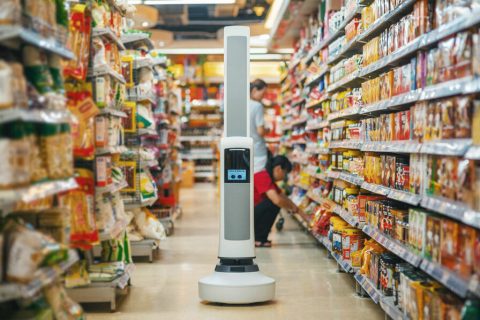🇳🇱 📊 FarmTrace, a Dutch startup, raised $6.5M for its animal farming data & analytics platform.
4️⃣ Supply chain deals from farm to restaurant: times have really changed. Boring, B2B and SaaS (software as a service, i.e. subscriptions) are the new sexy in FoodTech.
- 🇺🇸 🔄 Silo, an American startup, raised $132M (among which $100M in debt) for its fresh produce supply chain management platform.
- 🇸🇦 🍽️ Kaso, a Saudi startup, raised $10.5M for its restaurant order management solution. It aims to digitise the relationship between restaurants and their suppliers and reduce food waste.
- 🇫🇷 🍽️ Stokelp, a French startup, raised €1.2M for its B2B marketplace to fight food waste.
- 🇺🇸 🤖 Simbe, a US-based startup, raised $28M for its inventory robots. The robot’s job is to monitor supermarket aisles to scout for missing items. Beyond replenishing the shelves faster, it helps with labour shortages while replacing a quite boring task.
🇳🇿 🔍 Oritain, a New Zealand startup, raised $57M for its product traceability platform. Using crime-scene-like techniques, Oritain can identify where a coffee bean (and many other crops) originates. This enables large companies to be certain of the origin of their raw materials. It is exciting to see this kind of example of tech being used to have a “real” impact on the food supply chain and create more trust between its players.
🇧🇪 🌱 Aphea.Bio, a Belgian startup, raised €70M for its biostimulant and biocontrol products. It hopes to launch its first product next year.
🇫🇷 ♻️ B:bot, a French startup, raised €20M for its solution to transform plastic bottles into reusable material. It has 500 “robots” that transform the bottles into flakes inside stores, to be then recycled. By immediately transforming the bottles into flakes, it avoids many steps and reduces the volume transported.
🍹 Lyre’s, an Australian startup, raised £18M for its non-alcoholic spirits range.
🇫🇷 🌱 FinRes, a French startup, raised €4.1M for its insight platform for financing agriculture projects. It helps banks to take climate risks and to make informed decisions when giving (or not) loans to farmers.
🇹🇷 🛵 Getir, the Turkish quick-commerce startup (and one of the very few “survivors” in this space), is shutting down UK warehouses to reach profitability. The company seems to be struggling with cash as it can barely pay its suppliers.
It is also rumoured that the company is planning to move out of Italy and The Netherlands. A couple of weeks ago, it was moving out of Spain. Before that, it was France… Is it the end for quick-commerce in Europe?
🇫🇷 🍔 NxtFood, a French plant-based alternatives brand, raised €10M from its corporate backers (Auchan and Roquette CVCs).








